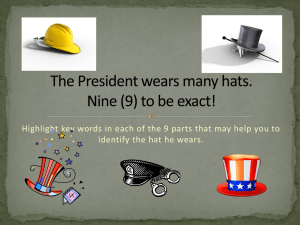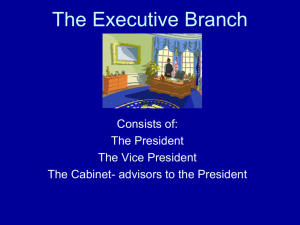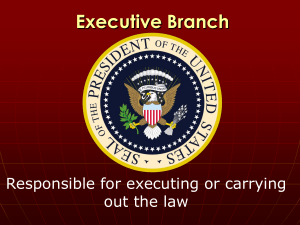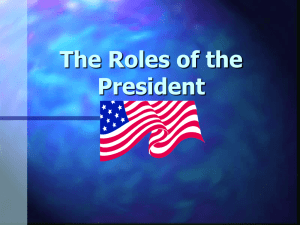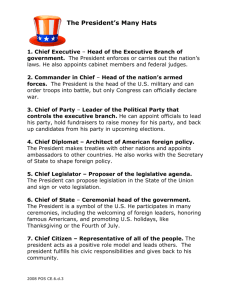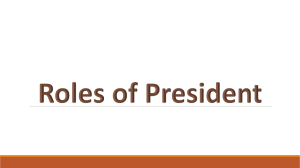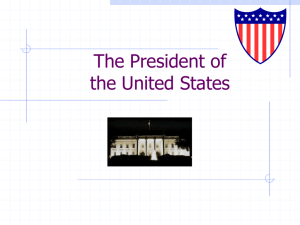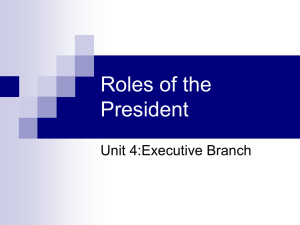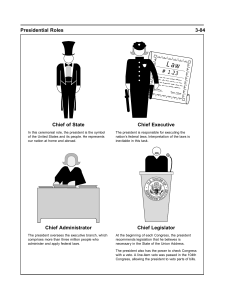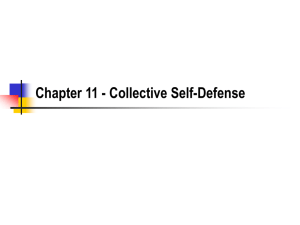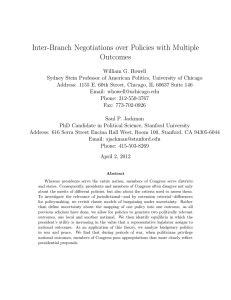The Roles of the President
advertisement
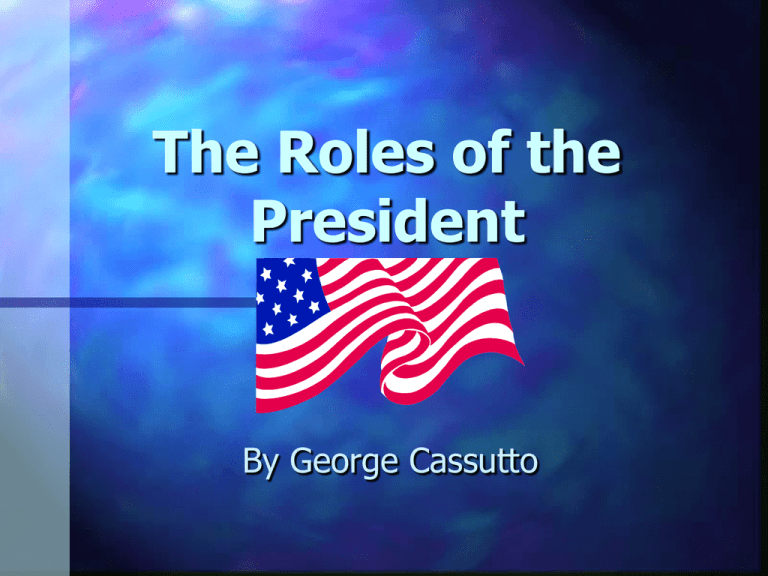
The Roles of the President By George Cassutto Table of Contents The President Chief of State Chief Executive – Tools of Influence Chief Diplomat Commander in Chief Chief Legislator Party Leader Economic Planner Simulation: President for a day!! The President: Some Facts Elected by the Electoral College Four year terms Two term limit, or 10 years – this was set with the 22nd Amendment Congress decides presidential salary: $400,000/yr salary Must be 35 years old, 14 year resident, and a natural born citizen. Role: Chief of State This is a ceremonial role. Acts as example for and symbol of the United States Represents America at special occasions and ceremonies. Kings and Queens are heads of state. Example: Awarding medals and speechmaking Click button to see an example of the Chief of State role Role: Chief Executive Acts as the boss of federal government workers in 14 executive departments. These departments help the President carry out, enforce, or execute the law. The president chooses cabinet members to advise and assist him. Example: Holding cabinet meetings and appointing federal officials. Tools of influence: How laws are carried out Issues Executive Orders: rules that have the force of laws Makes Appointments – The President appoints about 2,200 toplevel federal officials Removes officials they have appointed – Not always easy if have a lot of support (i.e. J. Edgar Hoover) Impoundment: the president sets aside or refuses to spend money that Congress has appropriated for a certain purpose Appoints federal judges Issues Reprieves: delays punishment Issues Pardons: forgiveness of a crime, and the associated punishment – Examples: Clinton took a lot of heat for pardoning a bunch of big donors just before leaving office; many of them were relatives. – Ford pardoned Nixon, saving the former President from future prosecution Amnesty – A group pardon to people for offense against the government – Example: Ford and Carter to draft dodgers during Vietnam President Bush with Cabinet Members Role: Chief Diplomat Directs US foreign policy – President gets most up-to-date information from CIA, State Department, Defense Department, and National Security Council – Ability to make decisive action – One man at top – Ability to make treaties – Executive Agreements – Recognition of foreign governments (i.e. Cuba) Conducts foreign policy by directing the actions of American ambassadors. Signs treaties and trade agreements with leaders of other nations. Example: Serves as host to other heads of state Role: Commander in Chief In charge of US Armed Forces. President decides where armed forces are to be stationed, weapons to be used. Role: Commander in Chief Power to make war Military operations and strategy – Presidents from military backgrounds Power to use nuclear weapons – – Truman is the only one who has, while others have considered the option (Nixon – tactical nukes in N. Vietnam) Controls problems within the country Role: Chief Legislator Congress has the power to make laws. President can propose bills and must sign bills into law. Presents his agenda to Congress in the annual State of the Union address. – FDR and LBJ had extensive legislative programs (New Deal and Great Society) Tools of Presidential Lawmaking – Give out political favors for congressional support – Veto power Role: Chief Legislator President Reagan before a joint-session of Congress. Stem Cell Bill Gets Bush's First Veto Click picture to read the article President Bush issued the first veto of his fiveyear-old administration yesterday, rejecting Congress's bid to lift funding restrictions on human embryonic stem cell research and underscoring his party's split on an emotional issue in this fall's elections. By Charles Babington; Washington Post Staff Writer Thursday, July 20, 2006; Page A04 Role: Party Leader Presidents help members of their party get elected or appointed to office. They make campaign speeches needed for re-election. Head of fund-raising for the party. Selects party’s national chairperson Political patronage – rewards, with jobs and contracts, those who support president and party during election Role: Economic Planner Monitors: – Unemployment – Inflation, taxation, business – The general welfare of the nation. He does not control the economy, but he gets credit if it goes well. Click on the picture to begin playing the game.
